Jeep Compass vs Kia PV5 – Differences & prices compared
Compare performance, boot space, consumption and price in one view.
Find out now: which car is the better choice for you – Jeep Compass or Kia PV5?
The Jeep Compass (SUV) comes with a Petrol MHEV, Plugin Hybrid or Electric engine and Automatic transmission. In comparison, the Kia PV5 (Cargo Van or Bus) features a Electric engine with Automatic transmission.
When it comes to boot capacity, the Jeep Compass offers 550 L, while the Kia PV5 provides 1320 L – depending on how much space you need. If you’re looking for more power, decide whether the 240 HP of the Jeep Compass or the 163 HP of the Kia PV5 suits your needs better.
In terms of consumption, the values are 17.50 kWh2 L per 100 km for the Jeep Compass, and 19.80 kWh for the Kia PV5.
Price-wise, the Jeep Compass starts at 34200 £, while the Kia PV5 is available from 32800 £. Compare all the details and find out which model fits your lifestyle best!
Jeep Compass
The Jeep Compass combines a rugged aesthetic with modern sophistication, making it a standout choice in the compact SUV segment. Its robust design is complemented by a comfortable interior that offers ample space and cutting-edge technology for a seamless driving experience. Whether tackling urban environments or venturing off-road, the Compass provides versatility and reliability, embodying the adventurous spirit synonymous with the Jeep brand.
details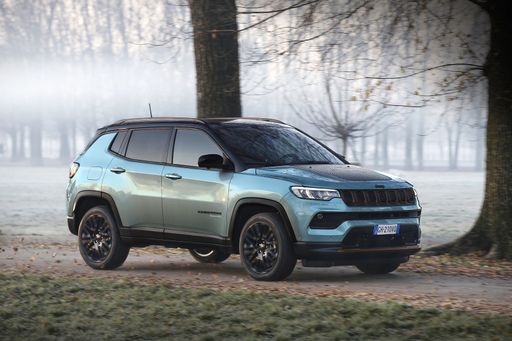 @ media.stellantis.com
@ media.stellantis.com
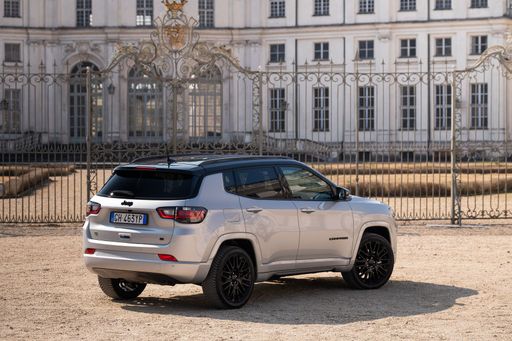 @ media.stellantis.com
@ media.stellantis.com
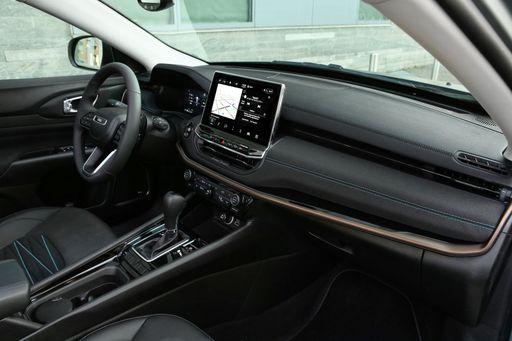 @ media.stellantis.com
@ media.stellantis.com
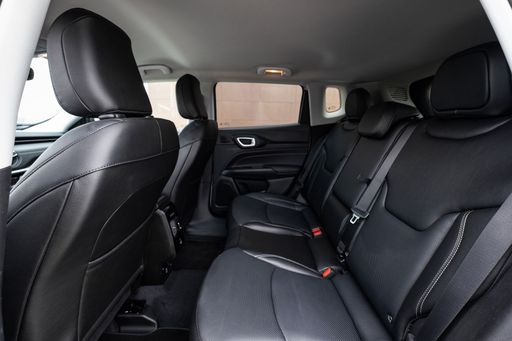 @ media.stellantis.com
@ media.stellantis.com
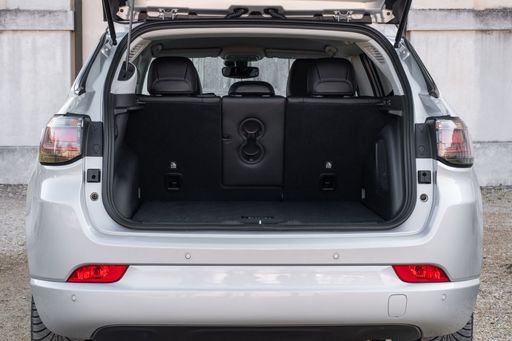 @ media.stellantis.com
@ media.stellantis.com
Kia PV5
The Kia EV5 is an exciting new entrant in the landscape of electric SUVs, promising a blend of style and innovation that captures attention. It boasts a sleek and modern design that aligns with Kia's evolving aesthetic identity, blending practicality with eye-catching details. With its foray into the electric vehicle segment, the EV5 is set to offer a highly competitive option for those looking to embrace sustainable mobility without compromising on comfort or tech features.
details

|
|
|
|
|
Costs and Consumption |
|
|---|---|
|
Price
34200 - 46900 £
|
Price
32800 - 38900 £
|
|
Consumption L/100km
2 - 5.9 L
|
Consumption L/100km
-
|
|
Consumption kWh/100km
17.50 kWh
|
Consumption kWh/100km
19.8 - 20.3 kWh
|
|
Electric Range
36 - 500 km
|
Electric Range
288 - 400 km
|
|
Battery Capacity
74 kWh
|
Battery Capacity
51.5 - 71.2 kWh
|
|
co2
0 - 133 g/km
|
co2
0 g/km
|
|
Fuel tank capacity
36 - 55 L
|
Fuel tank capacity
-
|
Dimensions and Body |
|
|---|---|
|
Body Type
SUV
|
Body Type
Cargo Van, Bus
|
|
Seats
5
|
Seats
2 - 5
|
|
Doors
5
|
Doors
4 - 5
|
|
Curb weight
1575 - 2198 kg
|
Curb weight
1860 - 2145 kg
|
|
Trunk capacity
420 - 550 L
|
Trunk capacity
1320 L
|
|
Length
4404 - 4552 mm
|
Length
4695 mm
|
|
Width
1819 mm
|
Width
1850 - 1895 mm
|
|
Height
1629 - 1675 mm
|
Height
1923 mm
|
|
Payload
465 - 470 kg
|
Payload
505 - 790 kg
|
Engine and Performance |
|
|---|---|
|
Engine Type
Petrol MHEV, Plugin Hybrid, Electric
|
Engine Type
Electric
|
|
Transmission
Automatic
|
Transmission
Automatic
|
|
Transmission Detail
Dual-Clutch Automatic, Automatic Gearbox, Reduction Gearbox
|
Transmission Detail
Reduction Gearbox
|
|
Drive Type
Front-Wheel Drive, All-Wheel Drive
|
Drive Type
Front-Wheel Drive
|
|
Power HP
130 - 240 HP
|
Power HP
121 - 163 HP
|
|
Acceleration 0-100km/h
7.3 - 10.3 s
|
Acceleration 0-100km/h
10.7 - 16.3 s
|
|
Max Speed
180 - 200 km/h
|
Max Speed
135 km/h
|
|
Torque
230 - 345 Nm
|
Torque
250 Nm
|
|
Number of Cylinders
4
|
Number of Cylinders
-
|
|
Power kW
96 - 177 kW
|
Power kW
89 - 120 kW
|
|
Engine capacity
1199 - 1469 cm3
|
Engine capacity
-
|
General |
|
|---|---|
|
Model Year
2024 - 2025
|
Model Year
2025
|
|
CO2 Efficiency Class
D, B, A
|
CO2 Efficiency Class
A
|
|
Brand
Jeep
|
Brand
Kia
|
Jeep Compass
Exploring the Jeep Compass: A Modern SUV with Innovative Features
The Jeep Compass continues to challenge the boundaries of what an SUV can be, offering a blend of practicality, efficiency, and rugged appeal. This model, distinguished by its diverse range of powertrains, promises to cater to various needs and preferences. From urban commuting to exploring off-road trails, the Compass delivers with aplomb.
Engine Versatility and Performance
Under the bonnet, the Jeep Compass offers a diverse lineup of engines designed to meet varying driver demands. With options ranging from mild hybrid petrol engines to advanced Plug-in Hybrid Electric Vehicles (PHEVs), the Compass provides both efficiency and power. This impressive engine choice results in power outputs from 130 to 240 PS, ensuring that there is a model suitable for both city driving and more ambitious off-road excursions.
Performance devotees will appreciate the Compass's quick acceleration, clocking 0-100 km/h in as little as 7.3 seconds. Meanwhile, fuel economy remains commendable, with consumption figures between 1.7 to 5.5 litres per 100 kilometres, making the Compass an economical choice for daily driving.
Innovative Hybrid Technology
The Jeep Compass brings cutting-edge hybrid technology to the forefront. The available plug-in hybrid variants offer electric-only driving ranges of up to 53 kilometres, ideal for environmentally conscious urban drivers. This zero-emission capability makes short trips sustainable without compromising on the flexibility offered by the internal combustion engine for longer journeys.
Dynamic Drivetrain Options
One of the main talking points of the Compass is its adaptable drivetrain options, which include both front-wheel drive and all-wheel drive systems. The 4xe PHEV models particularly stand out with their all-wheel drive, providing enhanced stability and traction suitable for varying terrains. Additionally, the automated transmission ensures smooth gear changes and an overall comfortable driving experience.
Design and Comfort
Beyond performance, the Jeep Compass excels in providing a stylish and functional environment. The SUV's dimensions, ranging between 4398 to 4404 mm in length and up to 1874 mm in width, offer ample interior space for both passengers and cargo. The boot space varies from 420 to 438 litres, accommodating the needs of families and adventure-seekers alike.
With seating for five, maximum comfort is assured, thanks to high-quality materials and thoughtfully designed interiors. The Compass integrates advanced technology seamlessly into its cabin, ensuring easy connectivity and an engaging driving experience.
Safety and Efficiency
Safety is paramount in the Jeep Compass, with a range of driver assistance features providing peace of mind. The model adheres to impressive CO2 efficiency standards, boasting a CO2 emission range between 37 and 123 g/km, making it both a responsible and reliable choice.
Furthermore, the Compass offers competitive running costs, with monthly expenses ranging from €1,095 to €1,315, and an average cost per kilometre between 43.8 and 52.6 cents. This cost-effectiveness further underscores the Compass’s value proposition.
Conclusion
Overall, the Jeep Compass stands out as a richly equipped, versatile SUV, ready to tackle urban or off-road challenges. With its blend of powertrain innovations, superior performance, and sophisticated design, it redefines what’s possible in the SUV segment. Whether for efficient city driving or adventurous journeys into the unknown, the Compass is ready to rise to the occasion.
Kia PV5
A Fresh Perspective on Cargo Vans: The Kia PV5
The Kia PV5 stands as a beacon of innovation in the realm of electric cargo vans. Known for its forward-thinking design and practicality, this model sets a new standard in its class. The PV5 combines cutting-edge technology with an eco-friendly design, redefining the expectations for businesses seeking sustainable transportation solutions.
Electric Power Meets Efficiency
At the heart of the Kia PV5 lies an advanced electric powertrain. The model is equipped with a 51.5 kWh battery, offering an impressive electric range of 291 km on a single charge. This robust power supply pairs with a front-wheel-drive system powered by an electric motor that delivers 121 HP (equivalent to 89 kW), keeping the operations both smooth and efficient.
Sustainability Without Compromise
The commitment to sustainability is evident in the PV5’s zero emissions, with a CO2 output of 0 g/km. The van maintains a CO2 Efficiency Class of A, clearly demonstrating Kia’s dedication to reducing the environmental impact of its vehicles. Businesses adopting the PV5 can confidently promote their green credentials while benefiting from the cost savings associated with electric driving.
Designed for Modern Business Needs
The Kia PV5 Cargo L2H1 Electric Automatic model is engineered for functionality and ease of use. Its spacious design accommodates two seats and offers a generous cargo area, making it perfect for diverse delivery needs. The van spans 4695 mm in length, 1850 mm in width, and 1923 mm in height, providing ample space to maneuver goods with ease.
Performance and Practicality
In terms of performance, the PV5 boasts a torque of 250 Nm and can accelerate from 0 to 100 km/h in 16.3 seconds. While its top speed is capped at 135 km/h, this is more than sufficient for urban and suburban delivery routes. The reduction gearbox ensures smooth transitions as it navigates through daily tasks.
Safety and Innovation
Safety is not compromised with the Kia PV5. It features a suite of safety technologies that support the driver in maintaining control and avoiding incidents. These innovations not only contribute to the safety of the driver and cargo but also offer peace of mind to businesses that prioritize the wellbeing of their workforce and goods.
The Road Ahead for Kia PV5
As the automotive industry continues to move towards electrification, the Kia PV5 exemplifies how cargo vans can adapt to this change seamlessly. It represents an essential step towards more sustainable business operations, providing a viable and efficient option for companies looking to reduce their carbon footprint while enhancing operational efficiency. The Kia PV5 is more than just a vehicle; it’s a strategic asset for any forward-thinking business.
What drivetrain options does the Jeep Compass have?
The Jeep Compass is offered with Front-Wheel Drive or All-Wheel Drive.
The prices and data displayed are estimates based on German list prices and may vary by country. This information is not legally binding.
